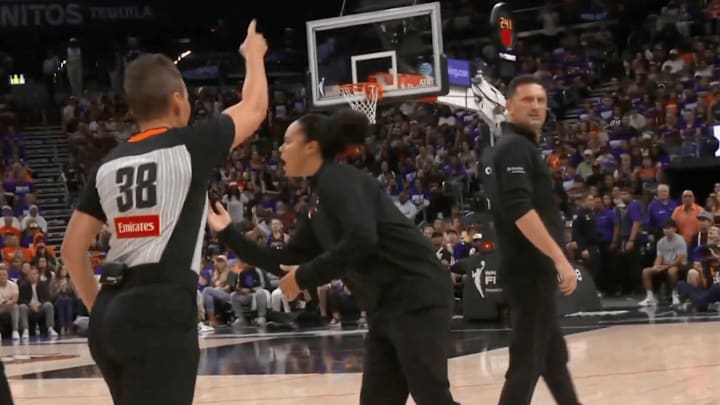
Phoenix Mercury Head Coach Nate Tibbetts, just days after his team’s heart-breaking loss in the WNBA Finals to the Las Vegas Aces, dropped a bombshell that detonated across the sports world. In an unscheduled, fiery press conference, Tibbetts publicly alleged that the Las Vegas Aces organization engaged in improper conduct—specifically, that they bribed league officials to influence the outcomes of crucial games in the championship series.
The sensational claim comes from a coach with recent, public history of conflict with the league’s officiating corps. Tibbetts was previously ejected in a pivotal game in the postseason for arguing a foul call, an incident he publicly labeled “embarrassing” and based on “the weakest double technicals ever.” Now, his frustration has metastasized into an unprecedented charge of deliberate malfeasance.
The Claim: A Tainted Championship
Tibbetts did not mince words, delivering a prepared statement that was part apology to his team and part indictment of the entire WNBA officiating structure.
“I have kept silent, abiding by the rules, enduring the fines, and accepting the suspensions, because that is what a professional does,” Tibbetts stated, his voice reportedly shaking with fury.
“But what we witnessed in those Finals games was not incompetence. It was an agenda. It was a predetermined outcome engineered by the team across the court, or those in their direct pay.”
He specifically referenced a series of late-game, non-reviewable calls that he claims overwhelmingly favored the Aces, tipping the balance of games that were otherwise neck-and-neck.
The core, preserved quote—the central, devastating charge that the Mercury franchise now officially stands behind—is unvarnished and direct: “The officials were compromised. The calls were criminal, and until the WNBA conducts a full, independent, federal-level investigation into financial corruption, the Las Vegas Aces’ championship will be forever tainted. We were not beaten by skill; we were beaten by a bank account.”
This is an allegation of Active Bribery, which, according to anti-corruption standards in sports governing bodies, refers to the offer or promise of an unjustified advantage (financial or otherwise) as an incentive for a person (the official) to act or refrain from acting in accordance with their duties. This is not simply questioning a blown whistle; it is questioning the moral fabric of the competition.
Context: A League Already Besieged by Officiating Woes
Tibbetts’s claims land in a league environment already severely strained by widespread criticism of officiating. The search results confirm a clear pattern of public frustration:
- Systemic Inconsistency: Prominent figures like Minnesota Lynx coach Cheryl Reeve have repeatedly blasted the officiating, labeling a Finals loss as a championship that was “stolen from us.” She has famously called the inconsistent officiating “fucking malpractice,” and players, including five-time All-Star Napheesa Collier, have accused the league of “negligence” for ignoring the problem.
- Lack of Accountability: Critics widely argue that WNBA referees operate with less support and monitoring than their male counterparts in the NBA (which, for example, uses Last Two Minute Reports and off-site replay centers). This perceived lack of accountability creates fertile ground for conspiracy theories and, now, claims of corruption.
- Prior Investigations: The WNBA has a clear precedent for initiating wide-ranging investigations into team misconduct. The Las Vegas Aces themselves were penalized (forfeiting a draft pick) after a previous investigation revealed violations involving improper benefits to players and organizational misconduct regarding Dearica Hamby’s pregnancy. The league has also conducted investigations into fan behavior and general player misconduct. This history means the WNBA cannot simply dismiss Tibbetts’s claims as mere coach sour grapes; they have established a procedure for internal and external review.

The WNBA’s Obligation: To Investigate or Collapse?
The seriousness of Tibbetts’s charge—that a championship was decided by bribery—leaves Commissioner Cathy Engelbert with no tenable middle ground. The reaction on social media from the Mercury fanbase and skeptical commentators suggests that anything less than a full, independent external investigation into the financial records of both the Aces organization and the officiating staff involved would be viewed as a cover-up.

For an organization focused on rapid growth and building a global brand based on integrity and skill, the specter of match-fixing or bribery is an existential threat. The claims must be either decisively proven or definitively disproven. To fail to investigate is to functionally validate the accusation in the eyes of a deeply frustrated segment of the public.
This story is no longer about basketball. It’s about corruption, integrity, and the future of a multi-billion dollar enterprise. The WNBA must now decide if its commitment to a “safe and inclusive environment for everyone” extends to ensuring a championship environment free from financial malfeasance. The sports world waits for a response to the most explosive, game-changing accusation the league has ever faced.